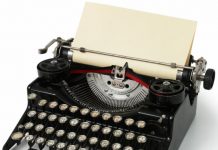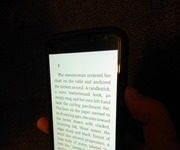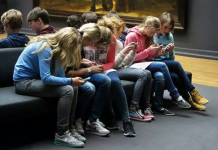
That’s the title of an article in the New York Review of Books by Tim Parks. Responding to ebook-hating authors like Jonathan Franzen, he says, in part:
Only the sequence of the words must remain inviolate. We can change everything about a text but the words themselves and the order they appear in. The literary experience does not lie in any one moment of perception, or any physical contact with a material object (even less in the “possession” of handsome masterpieces lined up on our bookshelves), but in the movement of the mind through a sequence of words from beginning to end. More than any other art form it is pure mental material, as close as one can get to thought itself. Memorized, a poem is as surely a piece of literature in our minds as it is on the page. If we say the words in sequence, even silently without opening our mouths, then we have had a literary experience—perhaps even a more intense one than a reading from the page. It’s true that our owning the object—War and Peace or Moby Dick—and organizing these and other classics according to chronology and nation of origin will give us an illusion of control: as if we had now “acquired” and “digested” and “placed” a piece of culture. Perhaps that is what people are attached to. But in fact we all know that once the sequence of words is over and the book closed what actually remains in our possession is very difficult, wonderfully difficult to pin down, a richness (or sometimes irritation) that has nothing to do with the heavy block of paper on our shelves.
The e-book, by eliminating all variations in the appearance and weight of the material object we hold in our hand and by discouraging anything but our focus on where we are in the sequence of words (the page once read disappears, the page to come has yet to appear) would seem to bring us closer than the paper book to the essence of the literary experience. Certainly it offers a more austere, direct engagement with the words appearing before us and disappearing behind us than the traditional paper book offers, giving no fetishistic gratification as we cover our walls with famous names. It is as if one had been freed from everything extraneous and distracting surrounding the text to focus on the pleasure of the words themselves. In this sense the passage from paper to e-book is not unlike the moment when we passed from illustrated children’s books to the adult version of the page that is only text. This is a medium for grown-ups.
Thanks to Michael von Glahn for the link.


































The book now spans both print and screen delivery methods. Each delivery method will need to fulfill itself in this context. Print has many tactics and (digital) technologies to work with while the screen book is quickly developing its own delivery and display attributes. The Peter Meyers work, Breaking the Page, is filling in the screen book picture.
Where do we go from here? My own sense is that we need to look exactly between the delivery methods at a larger scope for the book itself. Doing that it is possible to understand that print is futuristic and screens are ancient; that is we can see the perennial nature of book readership encompassing all transacted meaning.